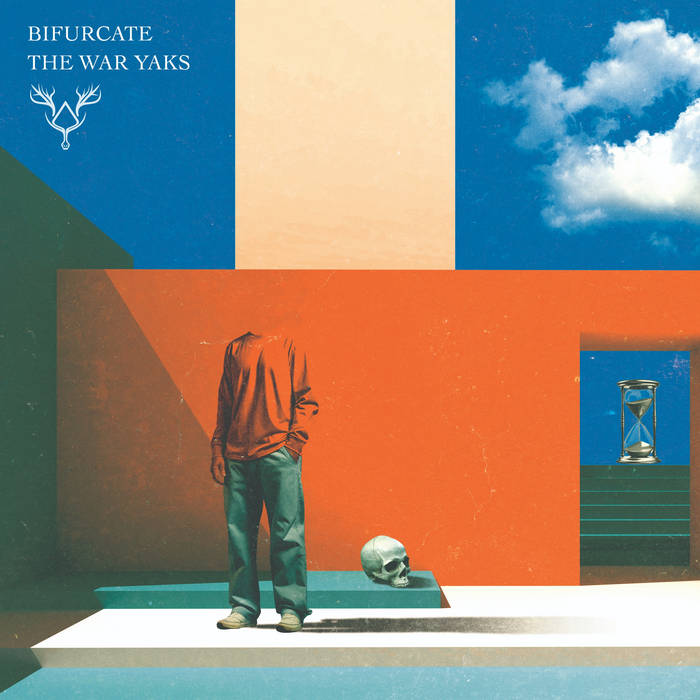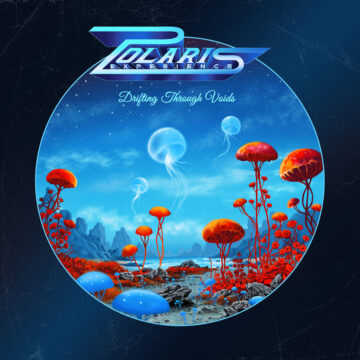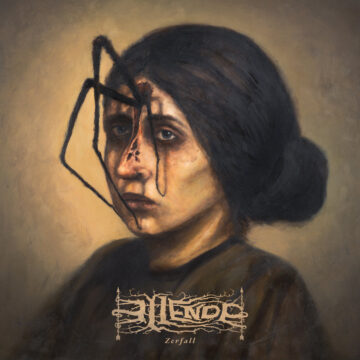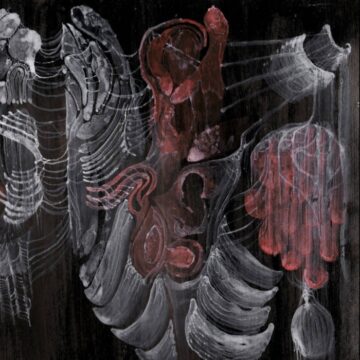Review: The War Yaks – Bifurcate

Style: Progressive rock, progressive metal (mostly clean vocals)
Recommended for fans of: Thank You Scientist, Bent Knee, The Mars Volta, King Crimson
Country: United States (New Jersey)
Release date: 01 August 2024
In Junji Ito’s classic manga The Enigma of Amigara Fault, the titular fault spontaneously appears, dotted with thousands of holes in the exact size and shape of human beings. For reasons unknown, certain onlookers became inexorably compelled to crawl into these holes, crying out, “This is my hole! It was made for me!” I bring this up because, upon seeing the promo copy for The War Yaks‘ debut album, a similar sensation came over me. Offering a “huge focus on melodies and hooks, following the principle that complexity can still be catchy”, a “genre-blending tour of love and loss”, and, of course, “a generous dollop of saxophone”—it’s as if they reached into my brain and wrote an album specifically for my music taste. What I’m trying to say is that Bifurcate is my hole, and all that’s left to do is to see how I look when I come out the other side.
Fittingly, as it turns out, said hole is a far deeper and twistier tunnel than its enticing entrance may indicate. I often kick these reviews off by examining the intro track in depth, or some other tune that acts as a thesis statement for the record’s overall sound. However, Bifurcate is such a willfully esoteric, sonically diverse work that picking just one representative track would be a fool’s errand. There are still musical throughlines here, though, such as an overall approach to songwriting that favors carefully composed, interweaving melodic threads of vocals, guitars, woodwinds and piano over virtuosic bursts of notes and scales (with a couple exceptions). Despite this, there’s still an overall impression of shock and awe, largely stemming from the barrage of twists and turns in the composition. The band revels in sudden seismic shifts in rhythm and orchestration, melodies that zigzag slightly off course at the last moment, and while of course there are choruses and repeated motifs, they seldom play anything the exact same way twice.
The performances are generally strong across the board, with the clearest standout being frontwoman and bandleader Nat Rusciani, who is an absolute gem of a vocalist. Blessed with a frankly killer range, she pulls off everything from foreboding contralto intonations (“Quiet Omens”) to brassy, lounge-singer belts (“The Lengths”) to glass-shattering operatic highs (“Bifurcate”) with verve and panache, plus a heavy dose of vibrato. The other primary member, saxophonist Anthony Warga, often wields his instrument like a second guitar, pulling out intricately assembled riffs and leads aplenty alongside guitarist Esteban Mercado and flutist Kristina Bacich. After adding in Rusciani’s keyboard work, the Yaks have an abundance of instruments ready to provide melodies, countermelodies, and counter-countermelodies; thus Jesse Shaw’s bass wisely stays in the background, underpinning the music without ever shoving its way into the already-crowded spotlight.
Of the eight tracks on offer here, some feel musically and thematically closer than others, forming natural pairs of sorts. First up are the softer songs, opener “Codriver” and “Regression to the Mean”. Both are driven primarily by Rusciani’s piano and vocals, and though they eventually bring in enough guitar to rock out in spots, the overall vibe is smooth and melodic. Lyrically, they’re also the record’s two love songs, and match their music to their themes excellently; “Codriver” rests on a calming, odd-meter ostinato to reflect the relaxing, centering presence of a devoted partner amidst strife, while “Regression” is a bit more jumpy and unsettled as the narrator tries to settle into a new relationship while struggling with past traumas. Then there’s “Shroom Song” and “Train”, which represent the absolute opposite end of the spectrum: bonkers, white-knuckle journeys that hurl the listener through a dozen funhouse-mirror chambers filled with refracted shards of sound. These tracks were composed by Warga instead of Rusciani, and it’s clear that he has a looser, more boundary-breaking style, particularly evident in the crazed free-jazz sax freakout in “Train” that feels straight out of early King Crimson. Even the lyrics are different, forsaking the personal subject matter of the rest of the album in favor of sentient fungal networks and psychedelic train rides through spacetime.
The other four tracks are a bit harder to categorize, though they generally have a darker, more serious tone and focus on topics of abuse and mental health. It is here where the most powerful, emotional climaxes of the record are found, and when they hit, they hit. Take, say, the ending of “Footprints”, in which Rusciani’s righteous outrage is matched by the band breathlessly accelerating and accelerating until the riffs feel like they’re about to shake themselves apart. Or the simply drop-dead gorgeous buildup in “The Lengths” from soft piano to crashing guitars to a vocal performance specifically engineered to rip my heart straight out of my chest every goddamn time.
Of course, despite its many dizzying peaks, the album isn’t perfect all the way through. For a band that professes their dedication to hooks this loudly, some of the melodies here are a bit obtuse, sometimes adding a few extra words or landing on an odd note. This is particularly true of Warga’s songs; his more adventurous style tends to produce long, run-on verses that jump awkwardly all over the scale. Honestly it’s times like these I almost wish Rusciani were a weaker vocalist so she could veto lines like this on the grounds of being impossible to sing. Then there’s the production, which comes across as a bit amateurish in spots. The softer portions of the album sound lovely, but once the distorted guitars and synths muscle their way in, they start feeling somewhat peaky and overbearing, particularly in the closing title track. There’s also the issue of the programmed drums, which are noticeably undermixed and plasticky-sounding. Having a human drummer, or at least a bit more volume in the mix, would have helped greatly in making the heavier moments stick. Also, while Rusciani has incredible cleans, her brief growl passages at the end of “Shroom Song” and “Bifurcate” feel tacked-on, as though she included them more to say that she did than to actually serve the song. I get that she likes Opeth and all, but Åkerfeldt she ain’t.
Minor gripes notwithstanding, Bifurcate is a fascinating, deeply distinctive debut, a messy yet brilliant shotgun blast of raw talent that, with a tad more spit and polish, would have easily locked itself into top-ten status for the year. It is a twisted, kaleidoscopic journey-and-a-half through breathtaking beauty, anguish, and everything in between that has, indeed, left me a different person at the other side of it, and I thoroughly recommend it to any fan of music that is emotionally intense and tunefully weird. DRR DRR, y’all.
Recommended tracks: Codriver, The Lengths, Train, Footprints
You may also like: We broke the Weather, Eunuchs, Cabinets of Curiosity
Final verdict: 7.5/10
Related links: Bandcamp | Spotify | Official Website | Facebook | Instagram
The War Yaks are:
– Nat Rusciani (vocals, keyboards, production)
– Anthony Warga (saxophone)
– Esteban Mercado (guitar)
– Jesse Shaw (bass)
– Kristina Bacich (flute)



0 Comments